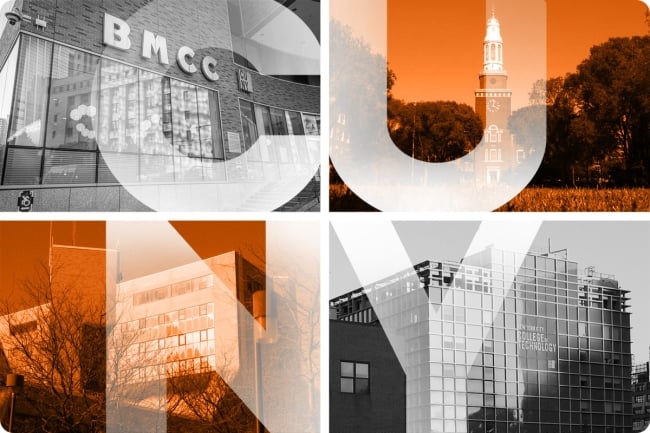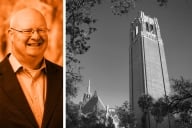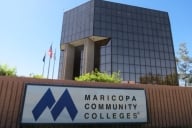You have /5 articles left.
Sign up for a free account or log in.

Four CUNY institutions where the professors teach: Borough of Manhattan Community College (top left), Brooklyn College (top right), Kingsborough Community College (bottom left) and New York City College of Technology (bottom right).
Photo illustration by Justin Morrison/Inside Higher Ed | Erik McGregor/LightRocket/Getty Images | todea/iStock/Getty Images | GK tramrunner RU/Wikimedia Commons | Rhododendrites/Wikimedia Commons
In June 2021, the Professional Staff Congress, a union that says it represents 30,000 faculty and staff members at the sprawling City University of New York, released a resolution supporting Palestinians and criticizing Israel.
“PSC-CUNY cannot be silent about the continued subjection of Palestinians to the state-supported displacement, occupation and use of lethal force by Israel,” the resolution said. It called on the Biden administration “to stop all aid funding human rights violations and an occupation that is illegal under international law.”
The following January, six professors who teach at four different CUNY colleges filed a lawsuit against the union that represents them. They called the resolution and the Professional Staff Congress itself antisemitic, saying in their suit that “PSC members have held chapter-level discussions” that “encourage support for the anti-Semitic and anti-Israel BDS [boycott, divestment and sanctions] movement.”
They asked a judge for the freedom to not be represented by the union whatsoever—even though a voting majority of their colleagues decades ago approved forming it to represent faculty members.
Public sector workers have the right to refuse to pay dues to their unions. But, under current law, they cannot refuse a recognized union’s exclusive representation of them. A ruling to the contrary would do nothing short of upend labor law in the U.S. and take the “collective” out of collective bargaining.
The case has dragged on for more than two years now, but the plaintiffs are receiving free legal representation from the National Right to Work Legal Defense Foundation and the Fairness Center, two nonprofits that don’t reveal their donors. And the National Right to Work group has won a landmark ruling weakening union power before.
It represented Mark Janus, the Illinois child support specialist who was the namesake of a 2018 U.S. Supreme Court decision, Janus v. American Federation of State, County, and Municipal Employees, that allowed public sector employees to opt out of paying their union dues.
Glenn Taubman, a staff attorney with National Right to Work, called the CUNY case “the next logical step after Janus.” He said that its logic is simple: “If I can’t be forced to fund this speech because I don’t like it or it is actually antithetical to my views, the question is: Why should I be forced to be associated with this speech?”
So far, the professors and their lawyers have lost. A panel of judges on the U.S. Second Circuit Court of Appeals ruled against them in March, and in April, the full group of Second Circuit judges refused to hear the case.
Now the plaintiffs are asking the U.S. Supreme Court to take up the case, saying it violates their First Amendment rights to be forced to accept representation from a union that supports the boycott, divestment and sanctions movement against Israel. “Because PSC wants to boycott Israel, the Jewish professors want to boycott PSC,” their request to the Supreme Court says. (In May, the PSC rejected a resolution that demanded several types of boycotts of Israel.)
Legal precedent isn’t in the professors’ favor, the union says. “SCOTUS has declined to hear such cases 12 times since 2014,” it said in a statement. “But the union busters keep trying. The Right-to-Work executives see rising support for unions and it scares them. So, they’re distorting the deeply held convictions and pain that some PSC members feel about Israel and Palestine to leverage their anti-union agenda and are using it to recycle the same failed legal arguments.”
Taubman, though, said the high court refused to hear predecessors to the Janus case many times before it finally did. “You have to keep knocking on the Supreme Court’s door,” he said, hoping the justices eventually “see the light and take the case.”
William Herbert, executive director of the National Center for the Study of Collective Bargaining in Higher Education and the Professions at Hunter College, part of CUNY, said that “in normal judicial times, the doctrine of stare decisis and the deference due to state labor policies would make it very unlikely” that the court would take the case. He said, “Exclusive representation, which is a cornerstone of the republican form of workplace democracy, in public sector labor relations has been repeatedly upheld in judicial decisions over the past four decades.”
But this Supreme Court has overturned precedent before. And it’s now faced with a request to take up this lawsuit in a post–Oct. 7 environment in which top politicians have amplified concerns about antisemitism on American campuses. Could the conservative majority of justices now be sympathetic to the professors’ claims?
Counterclaims of Discrimination
Some plaintiffs in this case haven’t been immune from claims that they, themselves, have been discriminatory.
Two plaintiffs, Michael Goldstein and Jeffrey Lax, business professors at Kingsborough Community College, have said they were targeted with retaliatory investigations for complaining about antisemitism on their campus. The Jewish News Syndicate reported that the probes may have been prompted by a tweet by an organization that they’re a part of, S.A.F.E. CUNY, calling one of their colleagues a “Jew hater.”
That organization, which stands for Students and Faculty for Equality at CUNY, describes itself on X as advocating “for Zionist Jews subjected to discrimination and exclusion from @CUNY and the @PSC_CUNY faculty union. Vigilantly non-partisan.”
Avraham Goldstein, a tenured assistant math professor at Borough of Manhattan Community College and a plaintiff in the case, told Inside Higher Ed he was one of the founding members of that group, alongside Michael Goldstein and Lax. Avraham Goldstein said those two were eventually found not guilty in the investigation, which lasted 10 months.
Avraham Goldstein said his Rate My Professors profile was hit with reviews calling him racist in 2023, the day after he’d asked his college’s president and several of its Social Justice and Equity Center employees to “sponsor a program on Jewish indigeneity and Zionism.” He made the request after the college hosted a display that, according to photos he provided Inside Higher Ed at the time, said that “what’s happening in Palestine is settler colonialism, military occupation, land theft and ethnic cleansing.”
He said he’s also been under investigation for 15 months after an administrator complained about his opposition to the display.
One plaintiff’s past controversy involved a Supreme Court justice. Mitchell Langbert, a plaintiff, is an associate professor of business at the Brooklyn College Koppelman School of Business who studies the political affiliations of university professors. The New York Times reported that, in 2018, hundreds of students demanded that Langbert be fired after he wrote on his blog, amid the confirmation hearings for now-justice Brett Kavanaugh, that “if someone did not commit sexual assault in high school, then he is not a member of the male sex.”
Langbert further wrote that “having committed sexual assault in high school ought to be a prerequisite for all appointments, judicial and political. Those who did not play spin-the-bottle when they were 15 should not be in public life.”
“His past statements, which he addressed in that story, have no relevance to this case,” a Fairness Center spokesperson said Thursday. Langbert said back then that his post was satirical. He didn’t return Inside Higher Ed’s requests for comment Thursday.
Nathan McGrath, president and general counsel of the Fairness Center, said among the plaintiffs are one professor whose great-grandparents died in the Holocaust, and another whose family fled the Soviet Union due to antisemitism. McGrath rejected the idea that his group and National Right to Work are using the professors’ antisemitism allegations to win a case weakening unions. “Our clients are trying to get away from unions that they believe are antisemitic and hostile to them,” McGrath said.
Avraham Goldstein said he objects to the PSC still being able to claim it represents 30,000 employees when people like himself have resigned from it. He noted that PSC used that figure in a statement this spring defending the pro-Palestinian protest encampments. “They still said that statement in my name, in support of the pro-Hamas encampments, two months ago,” he said.
Taubman, of National Right to Work, said the PSC union is “part of this whole labor for Palestine movement, so they call it. It’s really labor for Hamas, but that’s another issue.
“This is America,” Taubman said, a country where people get to choose their houses of worship, their fraternal organizations, their lawyers and more. “Nobody forces such an entity on you except in this context, and we’re opposed to that,” he said.








